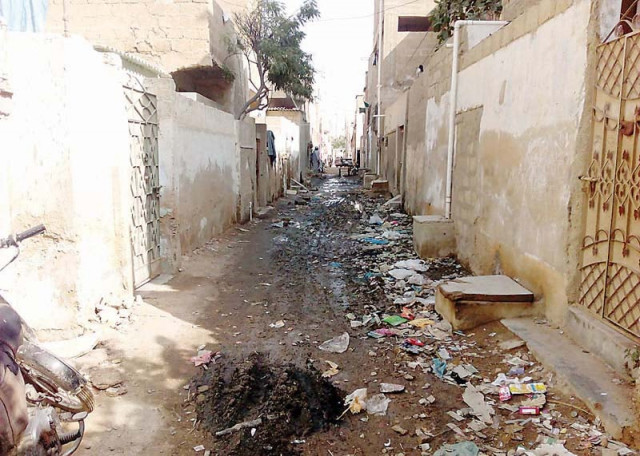Dirty business: Winter brings sewage out on city’s streets
KWSB blames cold weather for overflowing gutters; experts disagree

Sewerage water is accumulated in a narrow street in North Karachi 5B-1. PHOTO: NNI
In most of the world, winter brings with it snow, fog or just pleasant weather but in Karachi, the season is synonymous with overflowing sewage.
Since the last two months, residents have been left with no choice but to grapple with waste-filled roads on a daily basis. The Karachi Water and Sewerage Board (KWSB), responsible for keeping the city clean, has conveniently blamed cold weather to be behind the mess.
Flooded streets leave residents trapped in their homes
KWSB's deputy managing director (technical services), Iftikhar Ahmed Khan, told The Express Tribune that the self-cleaning velocity of sewerage reduces during winter. He said the accumulated silt in the lines usually sweeps away due to water pressure during the summer, but as the use of water decreases during winter, silt accumulates causing the pipes to overflow.
This argument did not sit well with Amber Alibhai, the general secretary of Shehri-Citizens for a Better Environment. The member of the pro-environment NGO said KWSB's claim was completely nonsensical. "They don't repair the broken sewers and come up with such lame excuses," she said.
Meanwhile, NED's architecture and planning department head, Dr Noman Ahmed, believes winter is the best time for KWSB to repair the sewage infrastructure. "KWSB should fix the water and sewage pipes as pressure is low these days," he suggested.
Listing reasons for overflow of waste, Ahmed said sewers are either completely uncovered or semi-covered, adding that connections between houses and sewers are also broken, due to which dust and solid waste starts depositing. "The overflow is not because of winter, but due to the lack of a regular maintenance programme," he claimed.
Damaged water line leaves roads submerged
The life of the trunk sewer - the main sewage line - has almost ended in the city, whereas sewers have increased, he explained, saying that is why pipes are unable to bear the load and joints have been disfigured. According to him, there should be comprehensive maintenance and rehabilitation of the sewers after every 10 years.
Greasy food
The expert also blamed solid food waste including disposed of greasy leftovers as the cause of overflowing gutters. However, he said in developed cities there are filters which absorb grease and do not let solid waste enter the pipes.

To all this, KWSB's Ahmed responded by saying the population which was supposed to be increasing by three per cent is now increasing by six per cent. "The designs of the sewage lines are not according to the development taking place in the city," he said further, adding that due to the construction of high-rise buildings the discharges in sewage lines have increased while the infrastructure is the same.
Reactive nature
Superintendent engineers of most of the city's districts failed to divulge how often they clean the sewage lines. District East's superintendent engineer, Wajid Iqbal Siddiqui, said they did not have any specific timetable for cleaning the sewers. "Wherever we find overflowing gutters, we clean them," he said.
His counterpart in District West, Muhammad Ovais Malik, repeated the same. However, he claimed most sewers in the area fell under the administrative domain of the District Municipal Corporation and thus they did not clean them.
New Anarkali: ‘The water from our taps stinks’
District Central's superintendent e ngineer, Muhammad Ali Shaikh, also said they only clean gutters when they start overflowing.
Manpower shortage
KWSB's chief engineer of water and sewerage, Muhammad Jamil Akhtar, complained of lack of manpower. "We need at least 3,000 sweepers to clean sewers and yet only have half the number," he said, adding that 275 sweepers were also recently sacked.
He explained that KWSB has a 350km-long sewage line and 250,000 manholes in the city under its watch. "How can we monitor all of that with such limited resources," he asked.
Published in The Express Tribune, January 25th, 2016.



















COMMENTS
Comments are moderated and generally will be posted if they are on-topic and not abusive.
For more information, please see our Comments FAQ